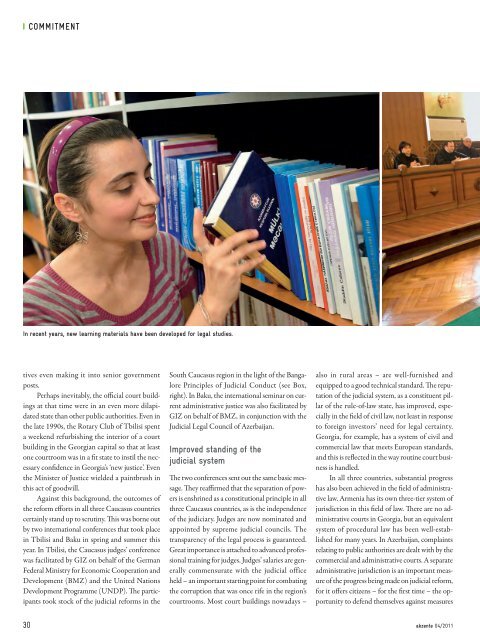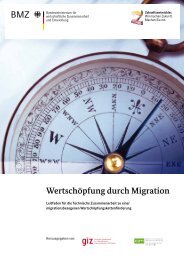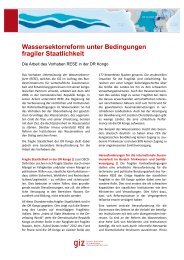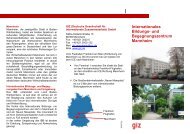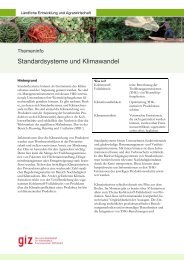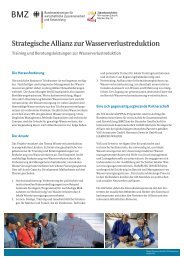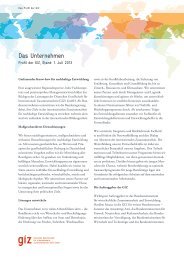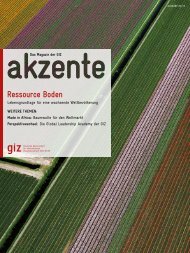Complete issue (pdf, 7520.08 MB, EN) - GIZ
Complete issue (pdf, 7520.08 MB, EN) - GIZ
Complete issue (pdf, 7520.08 MB, EN) - GIZ
Create successful ePaper yourself
Turn your PDF publications into a flip-book with our unique Google optimized e-Paper software.
CommItment<br />
In recent years, new learning materials have been developed for legal studies.<br />
tives even making it into senior government<br />
posts.<br />
Perhaps inevitably, the official court buildings<br />
at that time were in an even more dilapidated<br />
state than other public authorities. Even in<br />
the late 1990s, the Rotary Club of Tbilisi spent<br />
a weekend refurbishing the interior of a court<br />
building in the Georgian capital so that at least<br />
one courtroom was in a fit state to instil the necessary<br />
confidence in Georgia’s ‘new justice’. Even<br />
the Minister of Justice wielded a paintbrush in<br />
this act of goodwill.<br />
Against this background, the outcomes of<br />
the reform efforts in all three Caucasus countries<br />
certainly stand up to scrutiny. This was borne out<br />
by two international conferences that took place<br />
in Tbilisi and Baku in spring and summer this<br />
year. In Tbilisi, the Caucasus judges’ conference<br />
was facilitated by <strong>GIZ</strong> on behalf of the German<br />
Federal Ministry for Economic Cooperation and<br />
Development (BMZ) and the United Nations<br />
Development Programme (UNDP). The participants<br />
took stock of the judicial reforms in the<br />
South Caucasus region in the light of the Bangalore<br />
Principles of Judicial Conduct (see Box,<br />
right). In Baku, the international seminar on current<br />
administrative justice was also facilitated by<br />
<strong>GIZ</strong> on behalf of BMZ, in conjunction with the<br />
Judicial Legal Council of Azerbaijan.<br />
Improved standing of the<br />
judicial system<br />
The two conferences sent out the same basic message.<br />
They reaffirmed that the separation of powers<br />
is enshrined as a constitutional principle in all<br />
three Caucasus countries, as is the independence<br />
of the judiciary. Judges are now nominated and<br />
appointed by supreme judicial councils. The<br />
transparency of the legal process is guaranteed.<br />
Great importance is attached to advanced professional<br />
training for judges. Judges’ salaries are generally<br />
commensurate with the judicial office<br />
held – an important starting point for combating<br />
the corruption that was once rife in the region’s<br />
courtrooms. Most court buildings nowadays –<br />
also in rural areas – are well-furnished and<br />
equipped to a good technical standard. The reputation<br />
of the judicial system, as a constituent pillar<br />
of the rule-of-law state, has improved, especially<br />
in the field of civil law, not least in response<br />
to foreign investors’ need for legal certainty.<br />
Georgia, for example, has a system of civil and<br />
commercial law that meets European standards,<br />
and this is reflected in the way routine court business<br />
is handled.<br />
In all three countries, substantial progress<br />
has also been achieved in the field of administrative<br />
law. Armenia has its own three-tier system of<br />
jurisdiction in this field of law. There are no administrative<br />
courts in Georgia, but an equivalent<br />
system of procedural law has been well-established<br />
for many years. In Azerbaijan, complaints<br />
relating to public authorities are dealt with by the<br />
commercial and administrative courts. A separate<br />
administrative jurisdiction is an important measure<br />
of the progress being made on judicial reform,<br />
for it offers citizens – for the first time – the opportunity<br />
to defend themselves against measures<br />
30 akzente 04/2011


